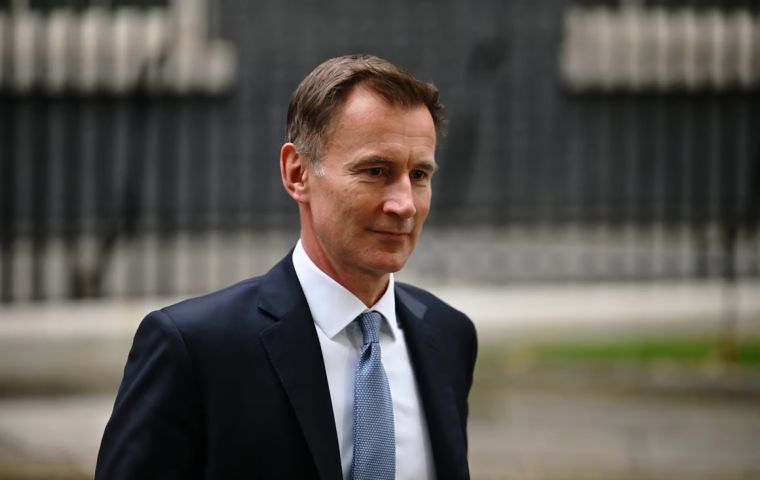MercoPress. South Atlantic News Agency
Stability, confidence the priorities, and hard times ahead said Chancellor Hunt in a momentous U-turn speech
 Jeremy Hunt said the unfunded tax measures had been eliminated and underlined that stability, confidence and helping the most vulnerable, were number one focus.
Jeremy Hunt said the unfunded tax measures had been eliminated and underlined that stability, confidence and helping the most vulnerable, were number one focus. Financial markets reacted positively Monday after the United Kingdom's new Chancellor of the Exchequer scrapped Prime Minister Liz Truss' tax-cutting economic stimulus package. Jeremy Hunt, who was appointed to the role only on Friday, said the unfunded tax measures had been eliminated and underlined that stability, confidence and helping the most vulnerable, were now the government's goals and number one focus.
In the three weeks since it was announced, the controversial so-called mini-budget triggered chaos in the financial markets, causing a run on the pound and sending British pension funds to the brink of insolvency. The crisis required the intervention of the Bank of England.
“It was a blatant misjudgment by the British government to want to implement such a debt-financed fiscal policy in an environment of high inflation,” David Kohl, chief economist at the Swiss private bank Julius Baer, pointed out.
Kohl said the UK was alone in trying to cut taxes, having just spent tens of billions on COVID subsidies while offering billions more to offset the skyrocketing cost of energy.
Before Monday's announcement, Truss had already U-turned on the most vexing part of her government's proposal — the removal of a 45% tax band for the wealthy during the worst cost of living crisis in decades.
As well as scrapping other tax cuts including a 1% saving for all taxpayers while proceeding with a plan to hike corporation tax to 25%, Hunt curbed the government's flagship energy price freeze, a measure that caps annual utility bills for the average family to 2,500 pounds.
The measure will now only run until April next year instead of late 2024, costing taxpayers significantly less than the expected 100 billion pounds.
Labeled the worst fiscal policy error in decades, the UK mini-budget caused such turmoil that Truss was forced to sack her original finance minister, Kwasi Kwarteng, barely a month into the job. The loss of investor and public confidence has sparked speculation that the prime minister, who only took office herself on September 6, will be next.
“Pretty much everything she [Truss] has done in the past 42 days has now been reversed by Hunt over a long weekend,” said Paul Dales, chief UK economist at the London-based Capital Economics.
Dales wrote in a research note that Hunt's decision would reduce the 72 billion pounds fiscal hole to 40 billion pounds. He said that the relief in the UK gilts (British government bonds)
market as a result of the U-turn could reduce government borrowing costs by between 7 and 16 billion pounds.
Some British media referred that Chancellor Hunt was in effect the new prime minister.
On Monday, the UK currency rallied by as much as 1.4% on the about-face, having regained almost a tenth of its value since almost hitting parity with the US dollar after the unveiling of the mini-budget. Yields, which move inversely to prices, on the 30-year UK bond fell sharply to 4.37%, having veered above 5% at one point last week.
Victoria Scholar, head of investment at Interactive Investor, said the markets were “responding positively” to the new chancellor's policy reversal. She said Hunt's focus on reassuring the markets stability and reinstating confidence appears to have worked so far. Chris Beauchamp, chief market analyst at IG, said investors see Hunt as more of a “safe pair of hands” and “for now the market seems happy to give the new Chancellor some time.
But Shore Capital’s consumer analyst Clive Black said the watering down of the energy cap would hit disposable incomes, cutting company earnings amid falling economic growth.
”If energy prices remain anywhere near where they are now then expect carnage in household and business finances from spring next year,“ Black said.
Hunt is still due to deliver a fuller medium-term fiscal plan as scheduled on October 31, which many analysts say will likely herald a new era of deep austerity.
”There will be more difficult decisions I am afraid, on both tax and spending, as we deliver our commitment to getting debt falling as a share of the economy over the medium term,” Hunt warned on Monday. There has been speculation that critical areas like defense, health care and education will face painful cutbacks.




Top Comments
Disclaimer & comment rulesCommenting for this story is now closed.
If you have a Facebook account, become a fan and comment on our Facebook Page!